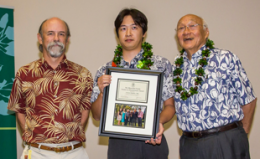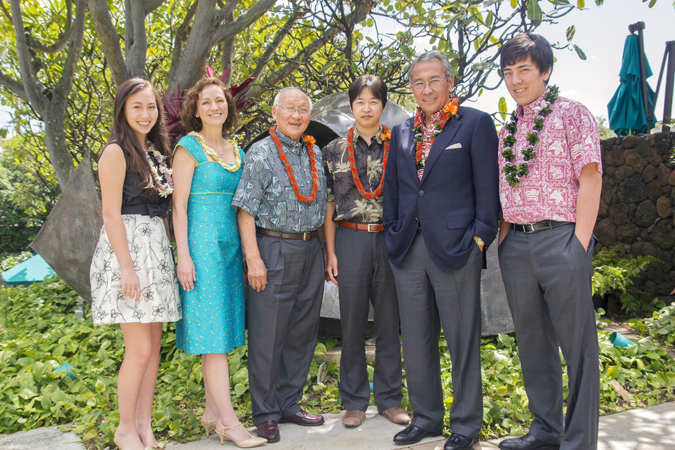Miyawaki Family “Trainee in Neuroscience” Award Endowment
“Neuroscience research is growing at JABSOM. The continued development of basic and clinical research in neuroscience at JABSOM is vital to the health of our unique population in Hawaiʻi, with special relevance to future psychiatric, neurologic and geriatric care."
— Dr. Robert A. Nichols, Department of Cell & Molecular Biology, RCMI-BRIDGES Program Director
The Miyawaki Family “Trainee in Neuroscience” Award Endowment at the John A. Burns School of Medicine (JABSOM) recognizes outstanding scholarship in the neurosciences. It celebrates the achievements of young investigators in the greater neuroscience community of Hawaiʻi and contributes to the foundation for a strong academic program in the neurosciences at JABSOM. This fund was established with a generous gift from the Miyawaki family.
The inaugural award recipient was selected by a panel of faculty at JABSOM along with counsel from advisors in the neurosciences. The 2013 recipient is Gotaro Kojima, MD, currently a Geriatric Medicine fellow at JABSOM.
The selection panel chose Dr. Kojima for his research article "Low Dietary Vitamin D Predicts 34-Year Incident Stroke: The Honolulu Heart Program," published in Stroke 43, 2163-2167, 2012. The findings from this study were also highlighted last year by the American Heart Association, TheHeart.Org, Medscape News, and locally in the Honolulu Star-Advertiser.

“Gifts like the Miyawaki Award Endowment are generous beyond the dollar value. They are gifts to future generations who may live better and longer because of a long-term commitment to both clinical and basic science research which lead to new and better therapies.”
—Dr. Jerris Hedges, John A. Burns School of Medicine Dean
Dr. Kojima is engaged in multiple clinical neuroscience research projects, including further research on vitamin D. Vitamin D is essential for maintaining healthy bones. In addition to osteoporosis and rickets, low vitamin D has been associated with a variety of diseases including high blood pressure, diabetes, heart attack and stroke.
“Though the main source of vitamin D is usually from skin exposed to ultraviolet light, vitamin D from the diet becomes more and more important as we get older, as a consequence of decreased skin vitamin D production,” said Dr. Kojima. He continued, “However, the impact of dietary intake of vitamin D on disease risk with aging is poorly understood.”
Dr. Kojima’s research involved using clinical data from the long-term Honolulu Heart Study. The research team discovered that individuals with lower vitamin D intake from diet were more likely to develop stroke later in life than individuals with high vitamin D intake through their diet.
“The results of our study suggest that eating more vitamin D-rich foods or taking vitamin D supplements might decrease the risk for developing stroke,” Dr. Kojima concluded.
Dr. Edison H Miyawaki and his son Dr. Edison K Miyawaki have enjoyed successful careers in health care. Dr. Miyawaki senior is the chairman/president/CEO of Nuuanu Hale and Liliha Healthcare Center, both skilled nursing facilities. He has supported UH as a volunteer in myriad ways including serving on the ʻAhahui Koa Ānuenue board, John A. Burns School of Medicine steering committee and the chair of the Hawaiʻi Warrior Football Centennial Celebration Gala. His son, Dr. Miyawaki, has been a board-certified neurologist since 1993 and currently serves an assistant professor at Harvard Medical School with offices at Brigham and Women's Hospital, Department of Neurology.

Questions? / More Information
If you would like to learn how you can support UH students and programs like this, please contact us at 808 376-7800 or send us a message.